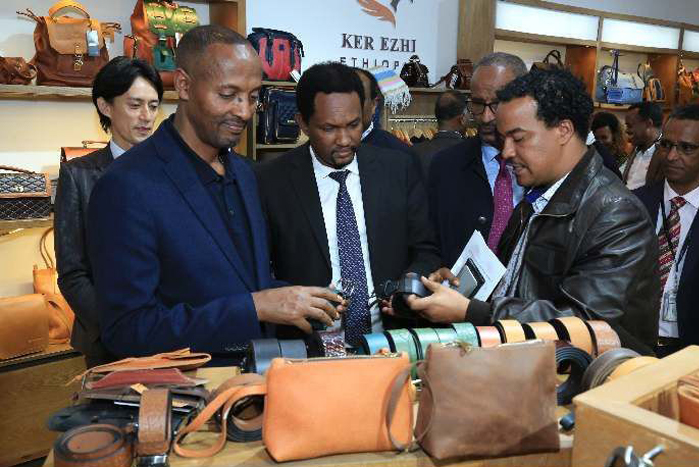
Commentaries | Jun 14,2025
Landing a dream job in electrical engineering felt like a given for Meseret Dereje, a 28-year-old graduate from Meqelle University. Five years of rigorous study painted a clear picture in her mind - a "high-paying", "stable career" awaited. That was four years ago. Although Meseret has submitted countless applications, she has only secured two interviews in her field.
"They either require skills beyond my current level or years of experience I just don't have," she said.
Meseret has taken on various jobs, from managing a family-owned cafe to freelancing at a payment collection company. She is currently pursuing a Business Administration degree, hoping for better prospects. But the ultimate solution, she fears, lies far from Ethiopia's shores.
"I've lost hope," she told Fortune.
Her trials reflect a national issue. There is a sharp contrast between the expectations of employers and young entrants making it into the labour force. Thousands of fresh graduates emerge from universities annually with a loose grasp of theoretical concepts and practical skills.
The average time between completing education and finding work in the country is estimated at around 12.4 months, according to research by the Policy Studies Institute, which reveals that most who found quick employment leveraged connections or were equipped with stand-out skills.
With a 13pc labour mismatch annually, some have opted to join the informal labour market, where they dictate their work hours. One of them is Jabez Solomon, a civil engineering graduate from Dire Dewa University nearly six years ago. He once found employment that aligned with his field, but it was far from what he envisioned.
"They were giving me jobs that an illiterate person could do," he told Fortune.
Jabez felt the tasks assigned were repetitive and lacked challenge. Discouraged by a lack of mentorship, inadequate wages, and hostile relationships with his employers, he also found the 9-5 schedule clashed with his desire for more flexibility. He opted to drive a family-owned car for a taxi-hailing company and remains regretful of spending five years in a university.
"I decided that working for another person does not suit me," he said.
Ethiopia has nearly a third of the population in a working age group (18-35). A major portion is employed in the informal sector, which stands at 86pc nationally and hovers around 25pc in the capital. They cite a lack of formal job opportunities, access to education and training, and restrictive labour regulations as reasons. Meanwhile, Policy Institute experts observe most graduates lack proficiency in industry-standard software programs or practical applications of their knowledge.
The 47 public higher education institutions in the country acknowledge the difficulties in teaching the necessary skill set in the fresh graduates they churn out each year.
According to Jemal Abafita (PhD), president of Jimma University, the issue goes two ways. He said the stagnant curriculum needs to be updated based on industry needs while employers should help new graduates integrate into the new environment with training.
"Some treat new graduates like an additional expense," he said.
The growing mismatch between graduates' qualifications and employer needs is a concern for many businesses. For years, Hailu Yohannes, founder of Revolution Engineering, has struggled to find suitable mechanical and electrical engineering employees. The three-year-old company designs maintains and installs electrical equipment for industrial businesses.
During job interviews, Hailu often found applicants lacking fundamental knowledge of basic electrical principles or struggling to interpret blueprints, even though they had high grades. He attributes this gap to a potential disconnect between the university curriculum and the practical needs of the industry and worries that graduates might be expecting faster career advancement.
"All they care about is getting a huge salary," Hailu told Fortune
Hailu has shifted to hiring experienced people on a short-term contractual basis.
"While I value fresh perspectives, our line of work requires commitment," Hailu told Fortune.
The contrast between employers' expectations and young entrants in the labour force is not limited to Ethiopia. A recent study in the United States found a high frustration rate (79pc) among employers, concerning Gen-Z employees (aged 27 or younger). About 21pc were fired within their first week, for reasons cited as a sense of entitlement, poor motivation, and lack of productivity.
Those who saw an opportunity like EthioJobs and Dereja, part of the Africa Jobs Network, are tackling the labour market gap by providing technology-based recruitment and job matching services. They post nearly 500 jobs on EthioJobs weekly, matching over 90,000 job seekers with employers in the past four years.
Siham Ayele, the country manager, identifies universities as a contributing factor with many graduates lacking the soft skills sought after by employers. They launched Dereja Academy eight years ago, to offer training programs designed to equip graduates with the soft skills needed to thrive in the workplace.
"Young people these days have several ambitions," she said " but employers accommodate few."
Siham stressed the importance of mentorship in addressing the needs of both employers and job seekers. She observed a massive change following the COVID-19 pandemic, with a rise in freelance jobs offering flexible hours and quicker pay.
"Companies will have to adjust to the new nature of the labour market," Siham said.
Recruitment issues pose a major threat companies face in meeting their goals. A recent survey by KPMG indicates that nearly 70pc of East African CEOs expected the rising inflation levels to impact their company's staff retention rates in the coming years. While the working modalities have shifted to remote during and after the pandemic, nearly 80pc of global CEOs expect a return to more traditional office practices, which was not well received by young employees.
Teresa Dereje, 28, a psychology graduate, has held three jobs for three months each, over the past five years. She leaves after feeling underpaid, overworked, or having long commutes to and from work. She has eventually settled into a position as a researcher at the Ministry of Peace, which offers her constant wage raises, fewer tasks, attentive mentors and more downtime.
"This is the perfect job," Teresa told Fortune.
While the Ministry of Labor & Skills ambitiously targets the creation of three million new jobs annually, poorly integrated data collection makes it difficult to paint a clear picture of the employment space. One promising solution comes in the form of the Ministry's ongoing efforts with 1,334 Technical & Vocational Education & Training (TVET) programs. These programs provide students with practical skills and industry-recognised certificates, potentially bridging the gap between what graduates learn and what employers require.
Mulu Keni, deputy director of training & institutional capacity at the Ministry, acknowledges the current mismatch between what universities teach and industry needs. He hopes that the recently formed Linkage Council, tasked with analyzing industry demand, will encourage students to pursue fields with high employability rates.
"The world of work is constantly evolving," Mulu told Fortune.
Initiatives from Dukem TVET College's focus on employer needs to ASTU's industry collaboration and practical skills training, offer a glimmer of hope for addressing the youth unemployment challenge.
The College has enrolled 400 students this year after conducting a two-month assessment of the current labour demand in programs that include woodwork, textile and leather production, electric maintenance and ICT. Zelalem Alemu, the dean, finds stagnant wages to be a barrier limiting how far their graduates advance in career paths based on the assessment of their post-graduate students.
"Many are trying to become self-employed," Zelalem told Fortune.
Ministry of Education has embarked on a regulatory overhaul of industry-university linkages, offering curriculum and program revisions with hopes of meeting the labour demand. Tesfaye Negewo, head of curriculum & program desk at the Ministry, acknowledges the population growth and the need for improved skills training. He believes the increased focus on practical experience will address the lack of hands-on skills that has plagued graduates in the past.
Institutions like the Addis Abeba Science & Technology University (AASTU), have been ahead of the curve in attempting to bridge the skills gap. Musin Qelil, academic director of AASTU, points to their program that integrates industry professionals into the teaching process. He said industry partners might co-teach specific courses, mentor students on real-world projects, or participate in curriculum development to ensure its relevance to current job requirements.
"We've incorporated these changes based on industry feedback and graduate outcomes," he told Fortune.
Labour market researchers point to a deeper structural economic problem underlying the nationwide skills gap. Jemal Mohammed, an education labour market researcher, argues that heavy reliance on imports contributes to the underdevelopment of innovative and real-world skills. He acknowledges that some imports might be due to factors like global competition and comparative advantage but an overdependence stifles domestic innovation and limits the types of jobs available.
"We are paying for foreign labour through our imports," he said.
He believes many businesses, lacking a competitive edge due to a saturated import market, require employees only for basic tasks.
Jemal recommends industry-specific investments in education. He recalled China's experience, which set its sights on a manufacturing-led economy that ignited massive investments in cultivating a capable, skilled labour force. By aligning educational programs with the needs of growing domestic industries, he believes Ethiopia can equip its graduates with the relevant skills and nurture a more competitive workforce.
PUBLISHED ON
May 25,2024 [ VOL
25 , NO
1256]

Commentaries | Jun 14,2025

Commentaries | Jan 07,2024

Fortune News | Jun 13,2025

In-Picture | Aug 04,2024

News Analysis | Nov 11,2023

Editorial | Jul 27,2024

Advertorials | Aug 02,2025

Commentaries | Jun 07,2025

Radar | Sep 04,2022

Commentaries | Aug 21,2021

Dec 22 , 2024 . By TIZITA SHEWAFERAW
Charged with transforming colossal state-owned enterprises into modern and competitiv...

Aug 18 , 2024 . By AKSAH ITALO
Although predictable Yonas Zerihun's job in the ride-hailing service is not immune to...

Jul 28 , 2024 . By TIZITA SHEWAFERAW
Unhabitual, perhaps too many, Samuel Gebreyohannes, 38, used to occasionally enjoy a couple of beers at breakfast. However, he recently swit...

Jul 13 , 2024 . By AKSAH ITALO
Investors who rely on tractors, trucks, and field vehicles for commuting, transporting commodities, and f...

Oct 11 , 2025
Ladislas Farago, a roving Associated Press (AP) correspondent, arrived in Ethiopia in...

Oct 4 , 2025
Eyob Tekalegn (PhD) had been in the Governor's chair for only weeks when, on Septembe...

Sep 27 , 2025
Four years into an experiment with “shock therapy” in education, the national moo...

Sep 20 , 2025
Getachew Reda's return to the national stage was always going to stir attention. Once...